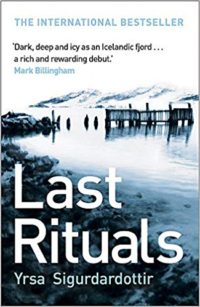Witches had to go to extraordinary lengths to acquire powers
 Last Rituals
Last Rituals
by Yrsa Sigurðardóttir
translated from Icelandic by Bernard Scudder
I remember learning about Yrsa Sigurðardóttir from the much-missed The Readers podcast, back when it was hosted by Gavin Pugh and Simon Savidge. They discussed her crime novels in such glowing terms that I immediately added this title, the first in her ongoing series, to my wishlist. But then I stumbled across a later book in the series in a charity shop, read that first and wasn’t blown away, so I settled for following Sigurðardóttir on Twitter (she gives good Twitter).
A few weeks back, I decided that I wanted to give crime another try (after the failure of one of my March reads) and this was on offer on the Kindle Store. Cue my second venture into the world of lawyer Thóra Guðmundsdóttir.
The crime that opens the book is the murder of German postgrad history student Harald Guntlieb at the University of Iceland. Some gruesome things have been done to the body that appear to be linked to his research into witchcraft. His family in Germany are not happy with the police investigation, so they ask their family lawyer Matthew to team up with an Icelandic lawyer – Thóra – to dig deeper.
“Thóra tried to conceal her low opinion of the Guntliebs. She itched to find the person who killed that poor boy. She could not conceive of a more wretched fate than a loveless upbringing. Children have a tangible need for affection and it was downright criminal to deprive them of it. No wonder Harald was strange.”
Now, Thóra is the first to acknowledge that she is not the obvious choice here. She’s a contract lawyer at a small firm that doesn’t handle any criminal cases. But she does speak fluent German, and her firm could certainly use the work. (Plus it’s always worth remembering that the entire population of Iceland is 300,000 – about half the size of the city of Bristol, where I live – so it does seem a bit more likely that people will get pulled into something that isn’t their speciality.)
Thóra is a single mother trying to actually spend time with her two children but this case inevitably involves long hours and off-duty homework. She learns about the history of witch trials, ancient books about spells and some unusual hobbies among Harald’s friends. This does involve the occasional info dump, which I tended to find a bit dull, but I liked Thóra enough and found the crime intriguing enough to keep reading. There are some good red herrings and Sigurðardóttir has a sense of humour that I appreciate.
“Witches had to go to extraordinary lengths to acquire such powers, including cooking and/or eating babies and having sex with the devil himself. Although she was no psychologist, Thóra guessed that the authors were sorely afflicted by the vow of chastity that they had sworn as Blackfriar monks. This was obvious from their unpleasantly bitter depictions of women. Disgust oozed from every account.”
I like the ordinariness of Thóra’s life, with fantastically everyday details such as her brushing a Cheerio off her clothes in the first scene she appears in, or receiving an e-mail from a friend with the subject “Let’s go on the piss this weekend”. She isn’t an inexplicable over-achiever or someone who is falling apart. She has friends, frustrations, likes and dislikes.
This time I definitely want to read more books about Thóra. Clearly I must learn not to start a series at book six.
First published in Iceland in 2005 by Veröld Publishing.
This translation published 2008 by Hodder & Stoughton.
Source: Amazon.